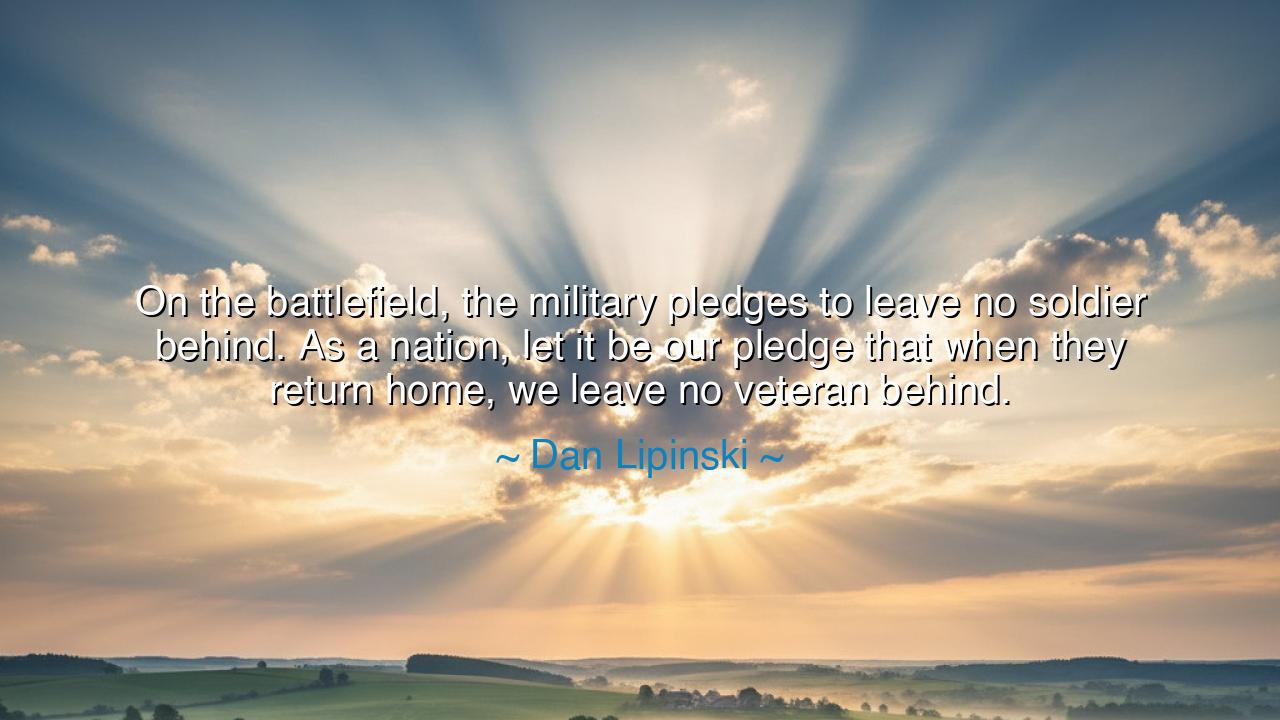
On the battlefield, the military pledges to leave no soldier
On the battlefield, the military pledges to leave no soldier behind. As a nation, let it be our pledge that when they return home, we leave no veteran behind.






“On the battlefield, the military pledges to leave no soldier behind. As a nation, let it be our pledge that when they return home, we leave no veteran behind.” — Dan Lipinski
In these words lies both a sacred vow and a solemn reminder. The first half of the quote speaks of the battlefield, where comradeship and duty bind warriors stronger than iron chains. In that place of thunder and fire, each soldier knows that though death may stalk them, they will not face it alone. The pledge to leave no soldier behind is not merely a rule of war — it is a covenant of honor, an unspoken oath that declares: your life matters, your struggle matters, and your brothers and sisters in arms will not forsake you. It is the flame that sustains courage when the night of battle grows dark.
Yet when the war drums fall silent, when the guns rest and peace returns, too often that sacred promise fades with the smoke. The second half of Lipinski’s words calls to the nation, to the people who sent their warriors forth. It demands that the same loyalty that guided them through the trenches be continued in the light of peace. For the veteran carries unseen scars — not only upon the flesh but upon the soul. To “leave no veteran behind” means to carry them home not only in body but in spirit; to heal their wounds, to hear their stories, and to help them find purpose in a world that has forgotten the taste of battle.
Think of Odysseus, the wanderer of old. When the fires of Troy were extinguished, his journey did not end — it began anew, upon a long and perilous road back to Ithaca. Though he had conquered foreign lands, his greatest struggle was in returning home. So too it is for the soldier: the war may end, but the battle within continues. The nation must be the hand that reaches out, the hearth that welcomes him home. Otherwise, we become like those ancient kings who celebrated victory yet forgot their heroes, leaving them to fade into silence and sorrow.
Consider the tale of Sergeant Alvin York, a simple farmer turned hero in the Great War. On the battlefield, his valor shone — he led his men through chaos and captured more than a hundred enemies. Yet when he returned, he sought no glory, only peace and purpose. His nation honored him, yes, but more importantly, they helped him rebuild his life — giving him land, a home, and the means to serve his community. That is the embodiment of Lipinski’s vision: a people who do not abandon their warriors when the parades are done, but stand by them as they stood for us.
To leave no veteran behind is not a task for governments alone. It is a calling to every citizen, a moral duty written upon the soul of a grateful nation. When we see a veteran struggling — in the shadows of poverty, in the grip of loneliness, in the silence of invisible wounds — we must act. Offer your time, your ear, your heart. Speak not empty thanks but living gratitude. For the freedom you enjoy was purchased at a price that cannot be repaid, only honored.
Let these words echo like a trumpet across the ages: “Leave no veteran behind.” It is a commandment of compassion, a decree of remembrance. The warrior who once shielded the weak must not, in peace, become the forgotten. The true measure of a nation’s greatness is not found in the battles it wins but in how it treats those who fought them. A society that cherishes its veterans is a society that understands the meaning of sacrifice.
So let this teaching be carried forward, as the ancients carried wisdom through the fire of time. Remember the fallen, uplift the living, and restore the weary. Visit the veteran’s hall, volunteer your hands, offer employment, speak kindness, and teach your children the cost of liberty. For when a people honors its defenders not just in war but in peace, it proves itself worthy of their defense.
And in that sacred balance — between battlefield and home, between duty and gratitude — we fulfill the eternal promise: that no soldier, whether in the dust of combat or in the quiet of old age, shall ever be left behind.






AAdministratorAdministrator
Welcome, honored guests. Please leave a comment, we will respond soon